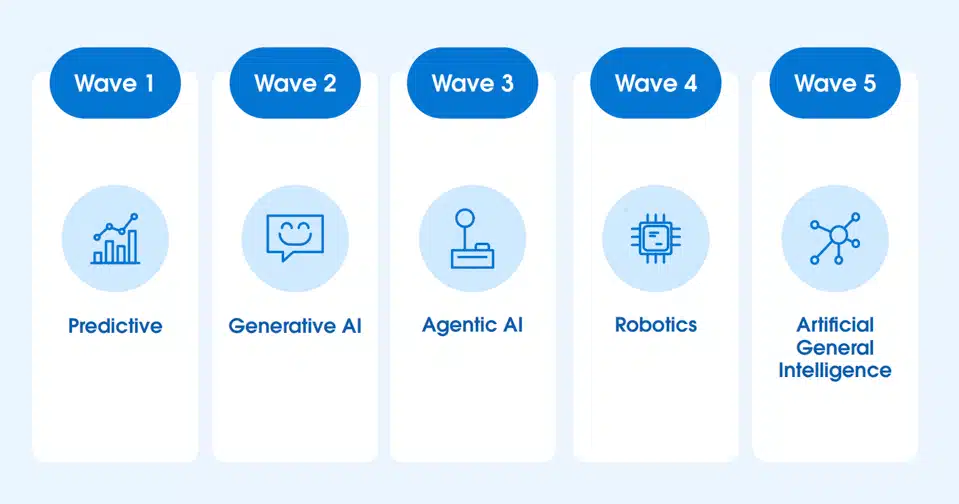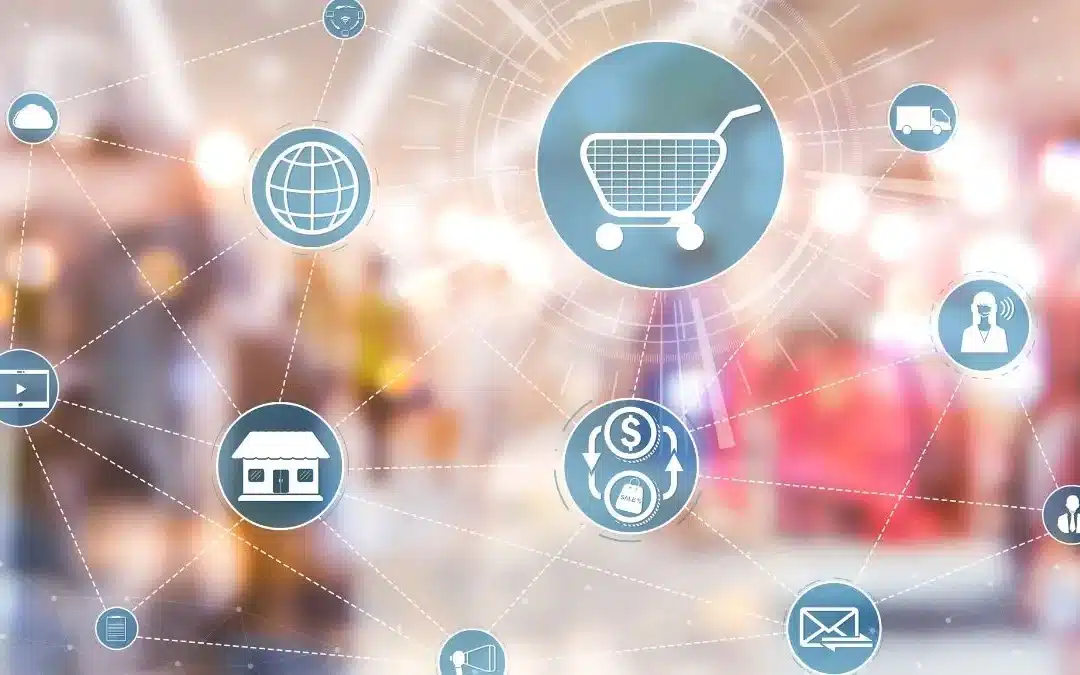If until recently imagining a supermarket with artificial intelligence could have seemed like a futuristic scenario, today Retail Artificial Intelligence is proving to be an extraordinary lever to increase productivity, improve operational efficiency and offer increasingly personalized shopping experiences.
Large-scale retail trade is increasingly recognizing the importance of adopting new technologies: the growth of Retail Artificial Intelligence in the Italian market is expected to be almost 30% per year until 2028 with the majority of Italian retailers recognizing its importance of adoption (Eurostat).
Estimated reading time: 10 minutes
Table of contents
RETAIL ARTIFICIAL INTELLIGENCE & GENERATIVE AI
The Retail AI revolution is entering its third wave. After predictive and generative AI, autonomous agents that can complete shopping tasks without human intervention are emerging as the next frontier. The “Consumer Goods Industry Insights Report: AI Edition” reveals that 32% of consumer goods companies have already fully implemented generative AI, with digital commerce being the primary focus area.
As the technology evolves from simply answering questions to taking action, brands and retailers are faced with urgent decisions about how to adapt their digital presence, product content and media strategies.
The image below shows the evolution of AI in 5 waves: from Predictive AI (2014), to Generative AI (2022), to Agentic AI (2024). The fourth wave will be agent-powered robotics. The fifth and final wave will be general artificial intelligence.

The consumer goods industry is not immune to the transformations enabled by Retail Artificial Intelligence.
In particular, the transition from generative AI to agentic AI represents a fundamental shift in capabilities. While chatbots and assistants like Amazon’s Rufus can answer product questions, autonomous agents can complete entire shopping journeys with minimal human intervention.
The research also found that 44% of consumer goods executives have already implemented generative AI solutions in customer service, an area that is perfectly suited to automating repetitive tasks such as handling simple requests, order support, and product recommendations.
How to use retail artificial intelligence?
Using Retail Artificial Intelligence means transforming every phase of the purchasing experience and operational management into a more intelligent, efficient and personalized process.
An example of the application of AI in retail are chatbots based on generative AI that can autonomously manage a wide range of requests, such as answering questions about products, tracking shipments or solving post-sale problems.
- Customer Care Retail chatbot
24/7 Support: customer care chatbots are available at all times to answer questions about orders, returns, products or store hours.
Returns management and order tracking: automate requests, sending real-time updates via WhatsApp or proprietary apps. - Marketing Retail Chatbot
Personalized campaigns: automatic sending of promotions based on the purchasing behavior of the individual customer.
Engagement on social and apps: chatbots that interact on whatsapp and social media with quizzes, games, surveys or launches of new products. - Sales Retail Chatbot
Product recommendation: automatic product suggestions while browsing or purchasing.
Cart assistance: chatbots that guide the user through checkout, reducing cart abandonment. - HR (Risorse Umane) chatbot
Onboarding and training: chatbots that guide new hires through company processes and offer on-demand training content.
FAQs management: questions about vacation, payroll, shifts or internal regulations are automatically managed. - Logistics Chatbot
Real-time tracking: chatbots that inform customers and internal operators about the status of deliveries.
Anomaly management: in case of delays or problems, the chatbot can automatically report the event and propose alternative solutions. - Supply Chain Chatbot
Stock monitoring: chatbots connected to management systems that report out-of-stocks or overloads.
Demand forecasting: integrated with predictive models, chatbots inform employees in advance of potential logistical criticalities or reordering needs.
RETAIL artificial intelligence: What do Autonomous Agents do?
If until yesterday, retail chatbots were limited to providing pre-set answers to customer questions (product information, assistance during site navigation, order updates), today autonomous AI Agents act actively based on complex and dynamic objectives. The approach goes from a simple interaction to a real intelligent collaboration between customer and system.
They guide the user in finding the best products
AI Agents don’t just propose a list of options, they learn in real time from the user’s behaviors and preferences. They analyze the context (seasonality, market trends, stock availability) and provide personalized recommendations, anticipated with respect to the expressed needs.
They add items to the cart based on preferences and specific needs
It’s no longer just one-off suggestions: agents build complete proposals. If a customer is shopping for ingredients for a recipe, the agent can autonomously add all related items to the cart.
They automate the management of PROMOTIONS
Agents can create, test and optimize personalized promotional campaigns without direct human intervention. They adapt offers, discounts and promotions in real time based on purchasing trends, customer feedback and market data.
With the ability to analyze huge volumes of structured and unstructured data, chatbots can offer highly personalized product recommendations in real time, increasing conversion rates and customer satisfaction.
As a Retail AI solution, autonomous agents can personalize sales communications, propose tailored offers, automate the creation of promotional content and analyze customer feedback to continuously optimize campaigns.
Finally, AI agents do not just interact with customers: they can also support internal employees by suggesting promotions, generating reports on product performance or helping buyers manage orders.
UNDERSTANDING CONSUMERS WITH RETAIL ARTIFICIAL INTELLIGENCE
With Retail Artificial Intelligence, we can analyze large volumes of data from different sources, such as purchase transactions, online interactions and customer feedback. This in-depth analysis allows us to:
Identify purchasing patterns: by detecting customer preferences and habits, retailers can personalize offers and improve customer satisfaction.
Forecast demand: using predictive models, AI helps estimate future demand, optimizing inventory management and reducing waste.
Segment customers: data analysis allows us to divide customers into homogeneous groups, facilitating targeted and more effective marketing campaigns.
Predict customers at risk of churn: predictive behavior analysis technologies allow us to identify customers at potential risk of churn and adapt communication choices, sales and marketing actions accordingly.
retail artificial intelligence in supermarkets

One of the biggest benefits a supermarket can gain from Retail Artificial Intelligence is the ability to offer highly personalized shopping experiences. The ability to collect and analyze data allows for tailor-made solutions for each customer, significantly improving satisfaction and loyalty.
- Personalized shopping lists: AI algorithms can analyze shopping habits, food preferences and even any specific dietary needs, creating tailor-made shopping lists for each customer. This not only optimizes the shopping experience, but also encourages the purchase of products that the customer may not have considered.
- Intelligent recommendations: thanks to advanced AI systems, supermarkets are able to suggest products in real time via apps or directly in-store. This personalization improves the relevance of the proposals, increasing the likelihood that the customer will purchase additional products.
- Intelligent carts: AI-equipped carts can monitor the items selected, proposing offers or promotions based on purchases made or preferences of the customer. This type of experience not only makes the purchase more interesting, but also smoother and faster.
These solutions create a shopping environment that constantly adapts to the needsità e alle preferenze individuali di ciascun cliente, migliorando l’interazione con il marchio e la soddisfazione generale.
Inventory Management and Operational Optimization
Not only for the customer, but also for supermarkets, AI offers extraordinary advantages in terms of efficiency and operational optimization. Automation and data analysis allow supermarkets to better manage resources and improve their performance.
Demand forecasting: AI can analyze historical data, market trends and even external factors such as weather conditions to predict the demand for certain products. This helps to optimize inventory, reducing waste and stock-outs.
Automatic shelf scanning: machine vision systems can constantly monitor shelves to automatically detect the need for replenishment. This process reduces the risk of shortages and ensures that products are always available to customers.
Dynamic pricing: thanks to Retail AI, supermarkets can adjust prices in real time based on demand, availability and competition. This flexibility allows them to maximize profits and maintain competitive prices.
Intelligent Workforce Planning: AI also helps manage the workforce more efficiently, optimizing shifts and attendance based on expected customer flows, reducing operating costs and improving customer experience.
Safety and Loss Prevention
Security in a supermarket is a fundamental aspect and Retail Artificial Intelligence also contributes in this area, making the process safer and more efficient.
Intelligent video surveillance: AI-powered video surveillance systems are able to analyze customer behaviors and detect suspicious activities, such as theft or anomalous behavior. This helps reduce security risks and improve the efficiency of surveillance operations.
Fraud detection: AI is also able to monitor payment transaction data, identifying potential fraud or anomalous transactions before they occur, ensuring greater protection for both customers and retailers.
Self-checkout and automated payment systems
Artificial intelligence is also revolutionizing the moment of payment, making the process faster and smoother.
Computer vision in self-checkouts: systems equipped with computer vision are able to automatically recognize products, speeding up the entire checkout process and reducing errors during scanning.
Automated payments: in a supermarket with Retail Artificial Intelligence, it is possible to complete the entire purchasing process without going through the traditional checkout. Automated payments, powered by AI, improve speed and efficiency, reducing waiting times for customers.
more applications of retail artificial intelligence
Retail Artificial Intelligence is not just about improving the shopping experience, but also touches on other crucial areas of supermarket management. For example:
Reducing food waste: by predicting the perishability of products, AI can reduce food waste, optimizing the management of fresh stock and improving overall efficiency.
Optimizing store layout: by analyzing customer movements, AI can suggest the optimal store layout, improving the shopping experience and product layout to promote better flow.
Improving the supply chain: AI also helps manage shipments and inventory more efficiently, reducing supply times and ensuring smooth and timely management.
BENEFITS OF RETAIL ARTIFICIAL INTELLIGENCE
The tangible benefits for supermarkets that integrate Retail Artificial Intelligence are significant:
Revenue growth: the automation of marketing, sales and customer service creates new revenue opportunities, thanks to a more fluid and personalized customer experience.
Reduction of costs: the automated management of numerous requests reduces the cost per contact and limits the need to expand the customer service team, allowing for leaner and more cost-effective management.
Improved agility: Retail Chatbots, powered by AI, respond quickly to market changes and consumer demands, accelerating the time-to-market of new initiatives.
Continuous innovation: the use of data collected by AI systems allows supermarkets to continuously improve their products and services, maintaining a competitive advantage in the long term.
Conclusions
In the near future, the most innovative brands in the retail and large-scale retail sector will be those capable of:
- Entrusting AI agents with complex and low-added-value tasks;
- Focusing on growth and differentiation strategies;
- Creating seamless, predictive and truly personalized shopping experiences.
For large-scale retail companies, investing in Retail Artificial Intelligence solutions today represents an unmissable opportunity to improve productivity, competitiveness and customer experience.
FAQS – Retail Artificial Intelligence
The most common tools include:
Chatbots and virtual assistants to provide real-time customer support.
Recommendation systems based on machine learning that suggest relevant products.
Predictive analytics to manage inventory, promotions, and sales forecasts.
Computer vision for product recognition, customer behavior analysis, and automatic shelf monitoring.
AI analyzes historical sales data, seasonality, and market trends to forecast product demand. This reduces waste, prevents stockouts, and improves the availability of the most in-demand products, while also optimizing warehouse costs.
The main challenges include data quality and integration from multiple channels, selecting the most suitable technologies for the business, staff training, managing customer privacy, and initial implementation costs. A gradual and targeted approach can reduce risks and maximize benefits.

